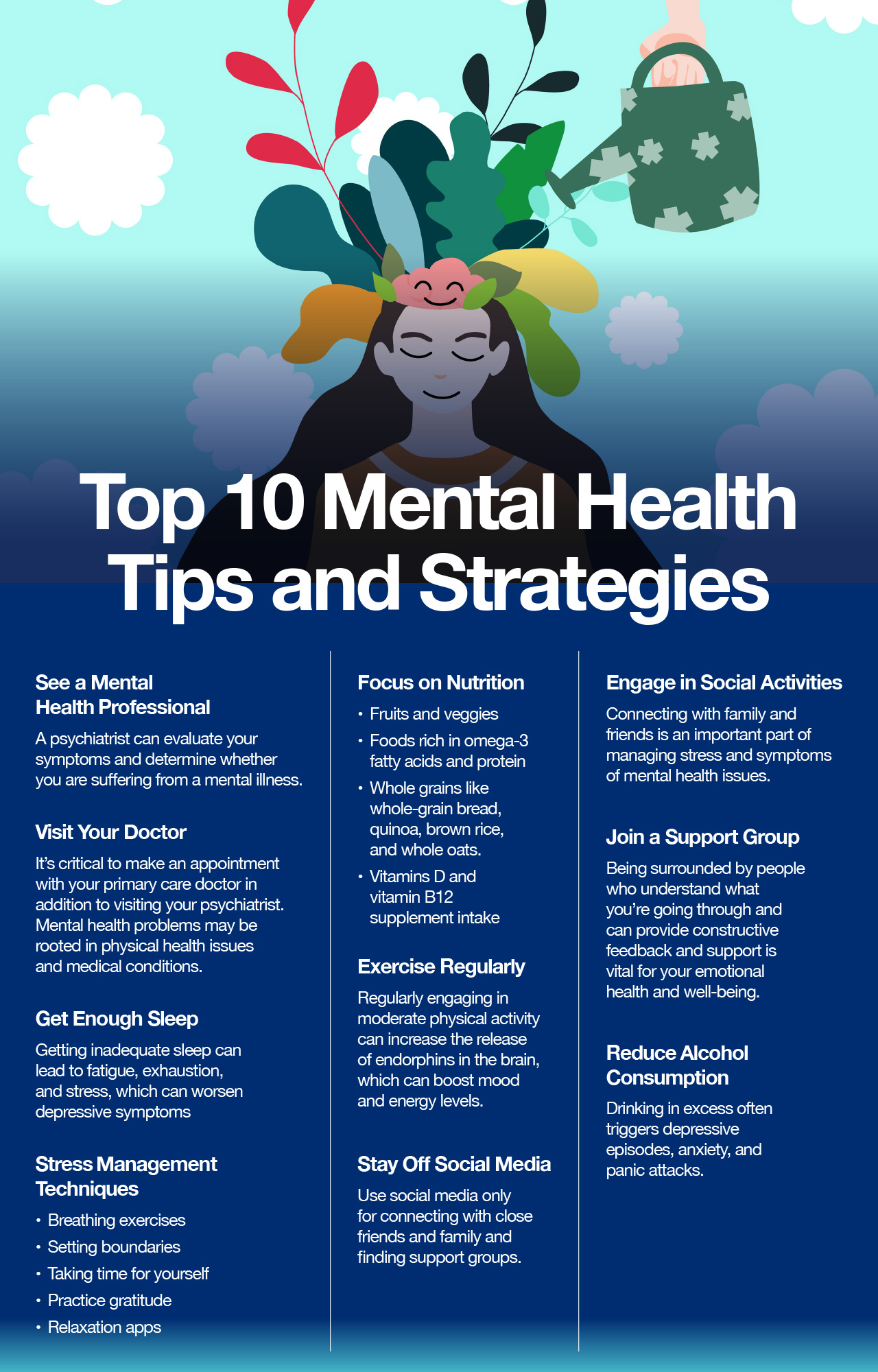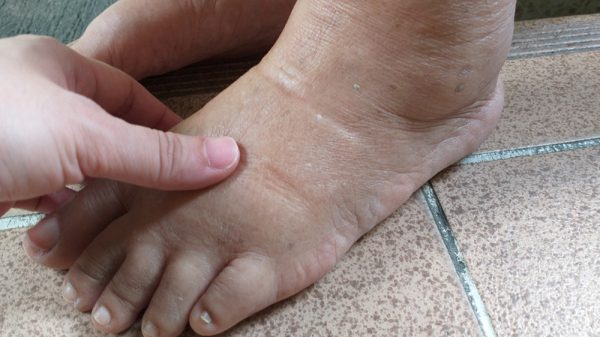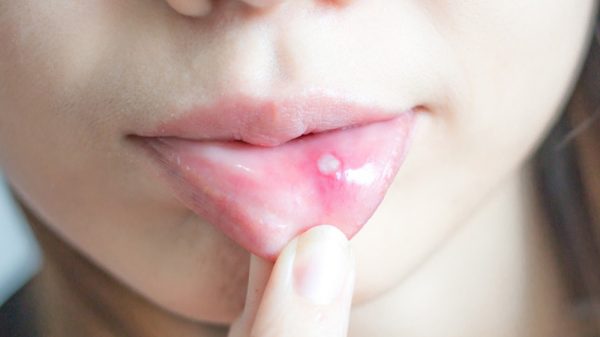Do you struggle with your mental health? You’re not alone. A significant percentage of Americans struggle with mental health issues at some point in their lives. Luckily, there are steps you can take to protect and support your mental health. Here we go through mental health tips to help you feel your best, manage stress, and get the support that you need. Read on to find out more!
1. See a Mental Health Professional
A mental health professional like a psychiatrist can evaluate your symptoms and determine whether you are suffering from a mental illness. A psychiatrist will work with you to create a treatment plan and may recommend medications like antidepressants. Your psychiatrist can also help recommend resources for connecting with a licensed therapist to help you develop coping mechanisms and work through stress and trauma. Both talk therapy and psychotherapy are effective strategies for managing high-functioning depression.
2. Visit Your Doctor
If you think you may be experiencing mental health issues, it’s critical to make an appointment with your primary care doctor in addition to visiting your psychiatrist. Mental health problems may be rooted in physical health issues and medical conditions. For example, disorders like polycystic ovary syndrome (PCOS) result in hormonal fluctuations that can affect sleep and mood patterns. Inflammatory conditions like fatty liver disease may also have mental health impacts.
Taking care of any co-occurring medical conditions may help resolve symptoms of depression and improve your mental health.
3. Get Enough Sleep
Sleep is vital for the body and mind to function properly, and being deprived of sleep can have serious repercussions for our mental health. Getting inadequate sleep can lead to fatigue, exhaustion, and stress, which can worsen depressive symptoms.
When we sleep, the body is hard at work repairing damage and facilitating cellular repair. For example, sleeping is important for us to heal from injury, recover from illness, and build muscle. We also need sleep just to recover and reset before the next day. To support your mental health and ease symptoms and anxiety and depression, take steps to improve your sleep routine. Here are a few tips:
- Establish a bedtime routine
- Go to bed and wake up at roughly the same time each day
- Reduce caffeine consumption
- Avoid electronics 2 hours before bedtime
4. Stress Management Techniques
Stress is an unavoidable part of life. But having coping skills to de-stress is crucial when it comes to protecting your mental health. Here are a few strategies you can employ to help keep your stress levels in check:
- Breathing exercises: Deep breathing can help relieve the physiological effects of stress. By taking deep breaths and slowing your breathing, you can help relieve anxiety and slow your heart rate. Plus, breathing exercises can conveniently be done anywhere and in essentially all situations.
- Setting boundaries: Sometimes, it can feel as if we are pulled in so many directions, with so many things requiring our attention. Since we are only human, we must draw boundaries and avoid trying to do everything. To help manage stress, set boundaries like turning off your phone after work and saying no to a gathering that is just too much to work into your schedule.
- Taking time for yourself: Taking time for yourself goes hand-in-hand with setting boundaries. Take time each day to read a good book, listen to a podcast, take a bath, or talk to your best friend. These small actions can help relieve stress and help you feel more centered.
- Practice gratitude: It can be easy to get caught up in what we don’t have or compare ourselves to other people. Taking time each day to think about what we’re grateful for can help shift our mindset.
- Relaxation apps: There are apps designed to help guide you through meditation or deep breathing. Try incorporating these apps into your routine to make relaxation a habit.
5. Focus on Nutrition
Nutrition can have a profound impact on mental health. A diet filled with sugar, saturated fat, and preservatives can actually increase inflammation that worsens conditions like anxiety and depression. On the other hand, an anti-inflammatory diet that offers a balance of crucial macronutrients and micronutrients can support the effect of medication and help provide relief from your symptoms. Try filling your diet with these types of foods:
- Fruits and veggies: Fruits and veggies are chock-full of anti-inflammatory components that are good for brain health. Vitamin, minerals, and antioxidants help all cells in the body work efficiently. Reach for foods like spinach, kale, broccoli, sweet potatoes, bell peppers, and celery.
- Omega-3 fatty acids: Omega-3 fatty acids are critical for reducing inflammation in the brain and fighting against depressive symptoms. You can get lots of omega-3 fatty acids from food sources like salmon, mackerel, flaxseeds, chia seeds, pecans, and walnuts.
- Protein: Protein is made up of smaller units called amino acids, which the body uses to build hormones, neurotransmitters, enzymes, and muscle tissue. For example, the essential amino acid tryptophan is used to produce serotonin, which regulates sleep and mood. It’s vital to get plenty of high-quality protein on a daily basis. Egg whites, lean meats, nuts, seeds, and beans are great sources of protein and essential amino acids.
- Whole grains: Whole grains are a vital part of a healthy diet. Whole grains are packed with protein, minerals, fiber, and B vitamins. The dietary fiber present in whole grains improves digestive health while reducing inflammation in the gut. Fiber feeds good bacteria in the gut, which produces anti-inflammatory compounds that travel to the brain and reduce inflammation in the brain as well. Reach for foods like whole-grain bread, quinoa, brown rice, and whole oats.
- Vitamins: Certain vitamin deficiencies may trigger depression and interfere with energy levels and sleep patterns. Deficiencies in vitamin D and vitamin B12 are particularly common causes of depression. Getting your vitamin D and B12 levels tested at your doctor’s office can shed light on whether they are connected to your symptoms. You may be advised to take vitamin D and vitamin B12 supplements.
6. Exercise Regularly
Taking care of your body is an important way to also take care of your emotional health, since the body and mind are connected. Regular exercise is an important part of managing depression and other mental health disorders. Regularly engaging in moderate physical activity can increase the release of endorphins in the brain, which can boost mood and energy levels. Even going on a brisk walk can be a helpful tool for improving your mood.
Moreover, exercise is also associated with better overall health. Aerobic activity improves the function of the cardiovascular system, while strength training builds muscle mass and promotes a healthy metabolism.
7. Stay Off Social Media
Though social media can be a great platform for connecting with others and forming support groups, it can also worsen symptoms of mental health conditions.
Use social media only for connecting with close friends and family and finding support groups. Avoid mindless scrolling and comparing yourself to others. Remember that Instagram and Facebook pictures and posts are highlights of people’s lives, often creating an illusion of perfection. Avoid comparing yourself to other people’s highlight reels. Spending too much time looking at social media can worsen mental health and exacerbate symptoms of depression. Plus, staring at a screen for hours may be detrimental for eye and brain health.
8. Engage in Social Activities
Human beings are social creatures, and we need social interaction to boost our mood. Connecting with family and friends is an important part of managing stress and symptoms of mental health issues.
During the COVID-19 pandemic, the risk of spreading coronavirus may prevent normal face-to-face socializing. Instead, try having socially-distanced, outdoor gatherings with one or two friends. Playing games via online platforms like Zoom or having FaceTime calls can also help individuals remain socially connected while staying safe.
9. Join a Support Group
If you are struggling with mental health issues, it’s helpful to find other people who are experiencing similar issues. Being surrounded by people who understand what you’re going through and can provide constructive feedback and support is vital for your emotional health and well-being.
10. Reduce Alcohol Consumption
In order to manage depression, it’s critical to limit alcohol consumption. Individuals with depression may be more prone to drinking in an effort to soothe anxiety and escape from negative thoughts and feelings. However, any relief that alcohol provides is short-lived, and ultimately worsens symptoms. Alcohol consumption increases inflammation in the brain and disturbs the body’s careful hormone balance that regulates sleep and mood. Drinking in excess often triggers depressive episodes, anxiety, and panic attacks.
Things to Keep in Mind
If you are struggling with your mental health, it’s important to seek professional help. Remember that the ability to fulfill daily responsibilities does not eliminate depression as a possibility. If you are suffering from symptoms of depression, make an appointment with your doctor or a mental health care provider as soon as possible.
If you are having suicidal thoughts, call the National Suicide Prevention Lifeline. If you think you or a loved one is a direct and immediate threat to themselves or others, call 911.
Key Takeaways: Mental Health Tips and Strategies
Learning new skills for supporting your mental health can have a profound positive impact on your health, well-being, and quality of life. A healthy diet, regular exercise, getting enough sleep, stress management techniques, and connecting with loved ones are all key components of a supportive lifestyle of mental health and well-being. In addition, it is crucial to see a mental health professional and primary care provider so you can make sure that you are addressing all mental and physical issues.
























